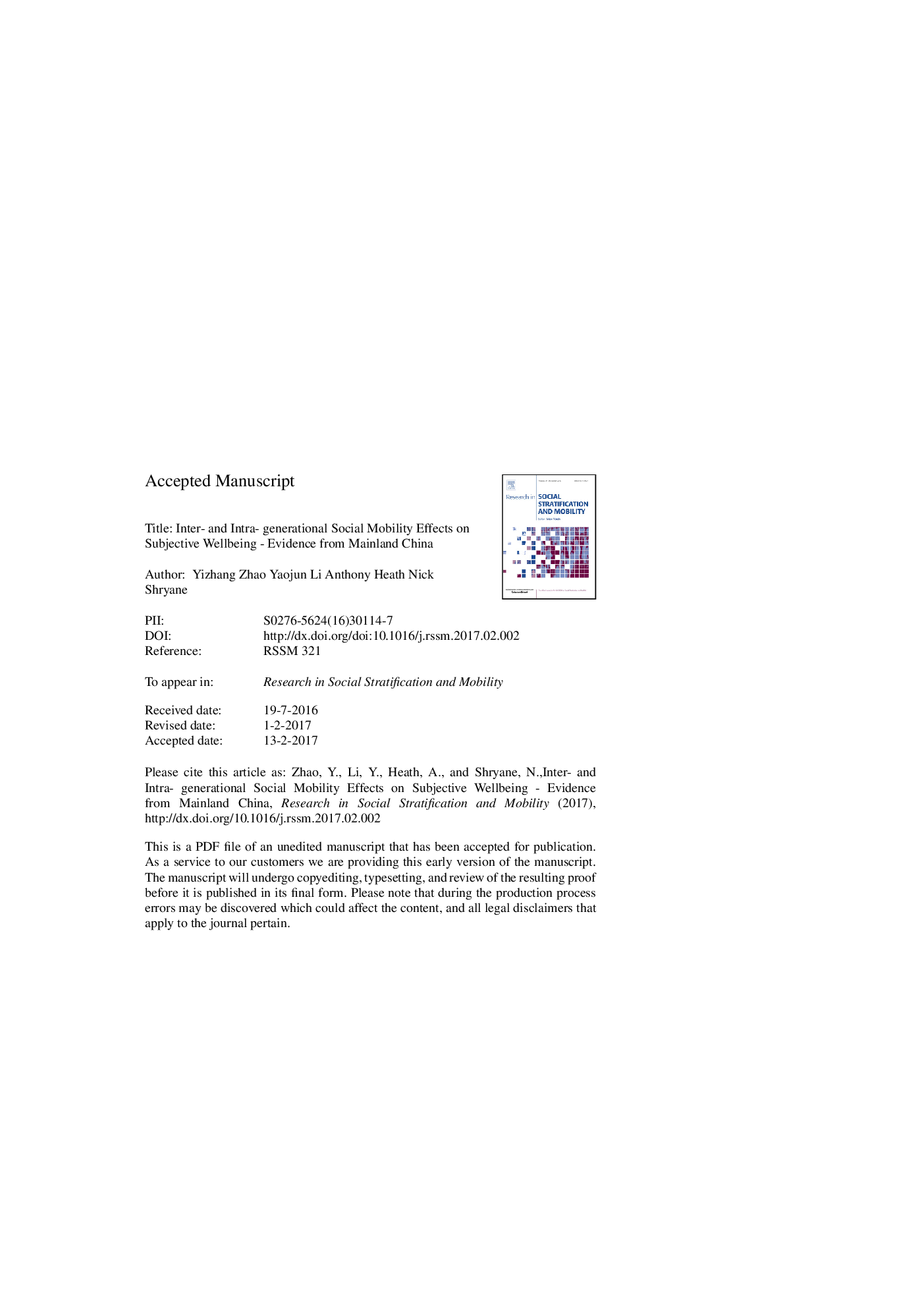| کد مقاله | کد نشریه | سال انتشار | مقاله انگلیسی | نسخه تمام متن |
|---|---|---|---|---|
| 5106604 | 1481564 | 2017 | 48 صفحه PDF | دانلود رایگان |
عنوان انگلیسی مقاله ISI
Inter- and intra-generational social mobility effects on subjective well-being - Evidence from mainland China
ترجمه فارسی عنوان
اثرات تحرک اجتماعی بین نسلی و نسلها بر سلامت ذهنی - شواهد از سرزمین اصلی چین
دانلود مقاله + سفارش ترجمه
دانلود مقاله ISI انگلیسی
رایگان برای ایرانیان
کلمات کلیدی
رفاه ذهنی، تحرک اجتماعی بین نسلی و نسل، مدل مرجع مورب، چین،
ترجمه چکیده
این مقاله به ادبیات تحقیقاتی در زمینه ی تحقیق و توسعه با نشان دادن اثرات متمایز تحرک اجتماعی بین گروهی و بین نسلی در رفاه ذهنی در سرزمین اصلی چین کمک می کند. بر اساس بررسی عمومی اجتماعی چین در سال 2006، از مدلسازی مرجع مورب و دیگر روشهای رگرسیون برای بررسی اثرات تحرک اجتماعی بر سلامت استفاده شد. ما متوجه شدیم که رفاه با تغییر در موقعیت های کلاس مرتبط است. در هر دو مسیر حرکت درونی و درون نسل، حرکت به سمت بالا به سمت بالاتر برای رفاه مردم مفید بود، در حالی که عواقب مختلف برای تحرک رو به پایین یافت شد: در مورد تحرک بین نسلی، تحرک رو به پایین در کلاس کتابچه تأثیر مشخص بر سلامت مردم به عنوان تلفن های همراه از پیش زمینه های ممتاز، دورنمای تحرک در مراحل ابتدایی شغلی و منابع باارزشی به ارث رسیده است؛ اما تحرک رو به پایین در زندگی حرفه ای خود منفی بود به رفاه ذهنی، به عنوان تلفن های پایین تر باید نه تنها مضرات مادی که در موقعیت پایین قرار دارد، بلکه همچنین اثرات روانی ناشی از مسیر رو به پایین است. ما نتیجه می گیریم که در حالی که کسانی که در معرض تحرک بین نسلی قرار دارند، می توانند به مزایای خانواده کمک کنند تا بتوانند سطح رفاه خود را حفظ کنند، یک مسیر مشابه در زندگی حرفه ای خود ممکن است پیامد مستقیم منفی باشد.
موضوعات مرتبط
علوم انسانی و اجتماعی
اقتصاد، اقتصادسنجی و امور مالی
اقتصاد، اقتصادسنجی و مالیه (عمومی)
چکیده انگلیسی
This paper contributes to the literature on well-being research by showing the distinct impacts of inter- and intra-generational social mobility on subjective well-being in mainland China. Based on the China General Social Surveys of 2006, we used diagonal reference modelling and other regression methods to assess the effects of social mobility on well-being. We found that well-being was associated with changes in class positions. In both inter- and intra-generational mobility trajectories, moving upward into a higher position was beneficial for people's well-being whereas different consequences were found for downward mobility: in the case of intergenerational mobility, downward mobility into the manual class did not have a marked effect on people's well-being as the downwardly mobile from privileged backgrounds held the prospect of counter-mobility at early career stages and inherited valuable resources; but downward mobility in one's own career life was rather detrimental to subjective well-being, as the downwardly mobile had to bear not only the material disadvantages found in the lower position, but also the psychological effects ensuing from the downward trajectory. We conclude that while those experiencing downward intergenerational mobility may resort to family advantages to help maintain their well-being levels, a similar trajectory in one's own career life may have a direct negative consequence.
ناشر
Database: Elsevier - ScienceDirect (ساینس دایرکت)
Journal: Research in Social Stratification and Mobility - Volume 48, April 2017, Pages 54-66
Journal: Research in Social Stratification and Mobility - Volume 48, April 2017, Pages 54-66
نویسندگان
Yizhang Zhao, Yaojun Li, Anthony Heath, Nick Shryane,
